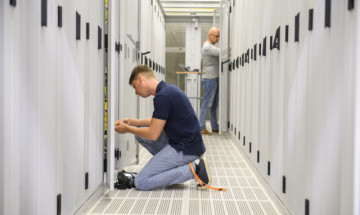We provide researchers with capacity and expertise for high performance computing, data processing and cloud computing. Find out how you can request access and support from SURF.
Direct purchase computing services
Are you responsible for IT within your institution (e.g. as CIO, ict department head, employee or manager) and do you need computing and storage capacity for educational purposes or long-term research projects? Or are there specific requirements that your computing environment must meet?
Then in some cases - instead of requesting capacity via the NWO computing call - it is more useful to purchase your required computing and storage capacity directly from SURF. The table below shows the various contract forms you can use to arrange this purchase.
Are you a researcher and would you like to know whether your institution has already purchased capacity from SURF that you can use? Then read the page 'Access for researchers via a direct contract'
Purchasing computing and storage capacity directly from SURF
Dutch research institutions (SURF members and sometimes non-members) can buy computing and storage capacity directly from SURF. You can choose from three different contract types. In the table below you will find the characteristics, rates, advantages and disadvantages of each form of contract.
| Direct purchase contract forms | |||
|---|---|---|---|
| Flexible contract (RCCS) | Fixed contract | Co-investment | |
| Contract form and characteristics | Annual contract with which you purchase credits in advance that you can use flexibly during the year for various SURF services and hardware types. | Fixed contract with which you buy capacity in advance for a specific service, e.g. SBUs on Snellius or x number of TB on Spider. | Multi-year contract (3 to 6 years) with which you purchase capacity for specific services at a competitive rate. |
| Advantages | When concluding the contract, you do not yet have to choose specific services or hardware. This allows you to respond flexibly during the year to what researchers need at that time. | You have guaranteed access to capacity throughout the year, at a favourable rate. | You benefit from lower costs through collective purchasing and you reserve exclusive capacity without the standard waiting time. |
| Disadvantages | Flexible tariffs are slightly higher than with the other contract types and hardware is not always readily available. | Your choice of services and hardware is fixed; switching in between is not possible. | Entry is only possible at a limited number of times, for a longer period and with a minimum deposit. Capacity is linked to the architecture and system configuration of the service and you can only deviate from this to a limited extent. |
| Usability |
|
|
|
| Contract duration | 1 year, with credits expiring at the end of the year. | 1 year | 3-6 years, depending on the co-investment round. |
| Rates | For SURF members, see the current SURF rates. For non-members, contact clusteronderzoek@surf.nl | For SURF members, see current SURF rates. For non-members, contact clusteronderzoek@surf.nl | Rates vary per co-investment round and depend on current hardware and energy prices. |
| More information and contract | Contact clusteronderzoek@surf.nl for an orientation discussion or to place an order. | Contact clusteronderzoek@surf.nl for an orientation discussion or to place an order. | Contact clusteronderzoek@surf.nl for an exploratory discussion. |
Frequently asked questions
As an institution, you are responsible for allocating credits to researchers. Are you a researcher, does your institution have a direct contract with SURF and would you like to arrange access? Then see the page 'Access for researchers via a direct contract' or put your question to the SURF helpdesk.
On average, there is an opportunity to co-invest once a year, usually when there is a major expansion.
No, the hardware remains the property of SURF. In exchange for your co-investment, you get an amount of virtual capacity equal to the value of the hardware. You can use that capacity flexibly, also on other comparable hardware. So you can temporarily use more computing power without losing capacity when you don't need it. This does not apply if you use the option to reserve your capacity exclusively without the standard wait time.
For annual contracts, you will receive the invoice immediately after closing. Co-investments are invoiced on an annual basis. The rate remains the same throughout the term of your investment.
Yes, you can. However, please note that different rates may apply, for example to cover future price increases. Please contact our relationship managers for this at clusteronderzoek@surf.nl.
SBU stands for Standard Billing Unit. This is a unit of account on Snellius that we use to compare the price of different types and generations of hardware. As these differ, we express them in SBUs. You can find more explanation on our wiki.
Yes, you can. We also provide consultancy services. You can find the rates and options for this in our rates brochure (under Additional services > SURF Consultancy).
